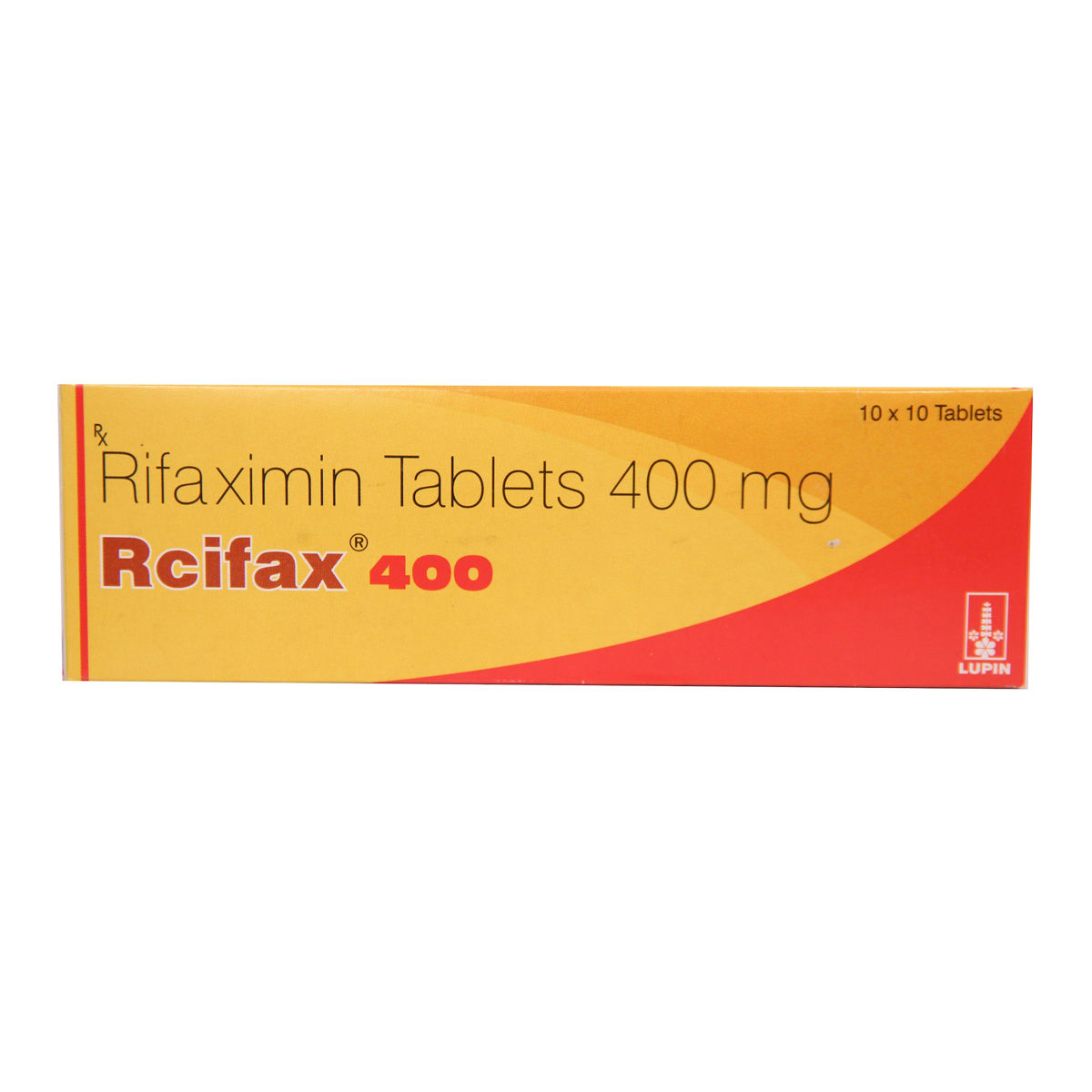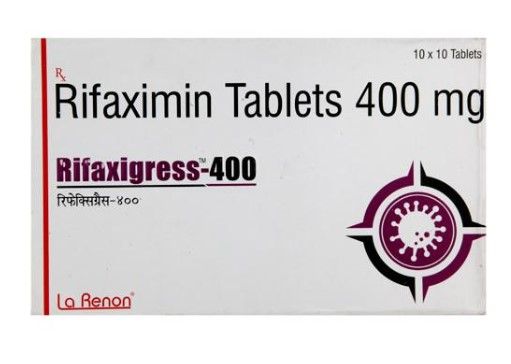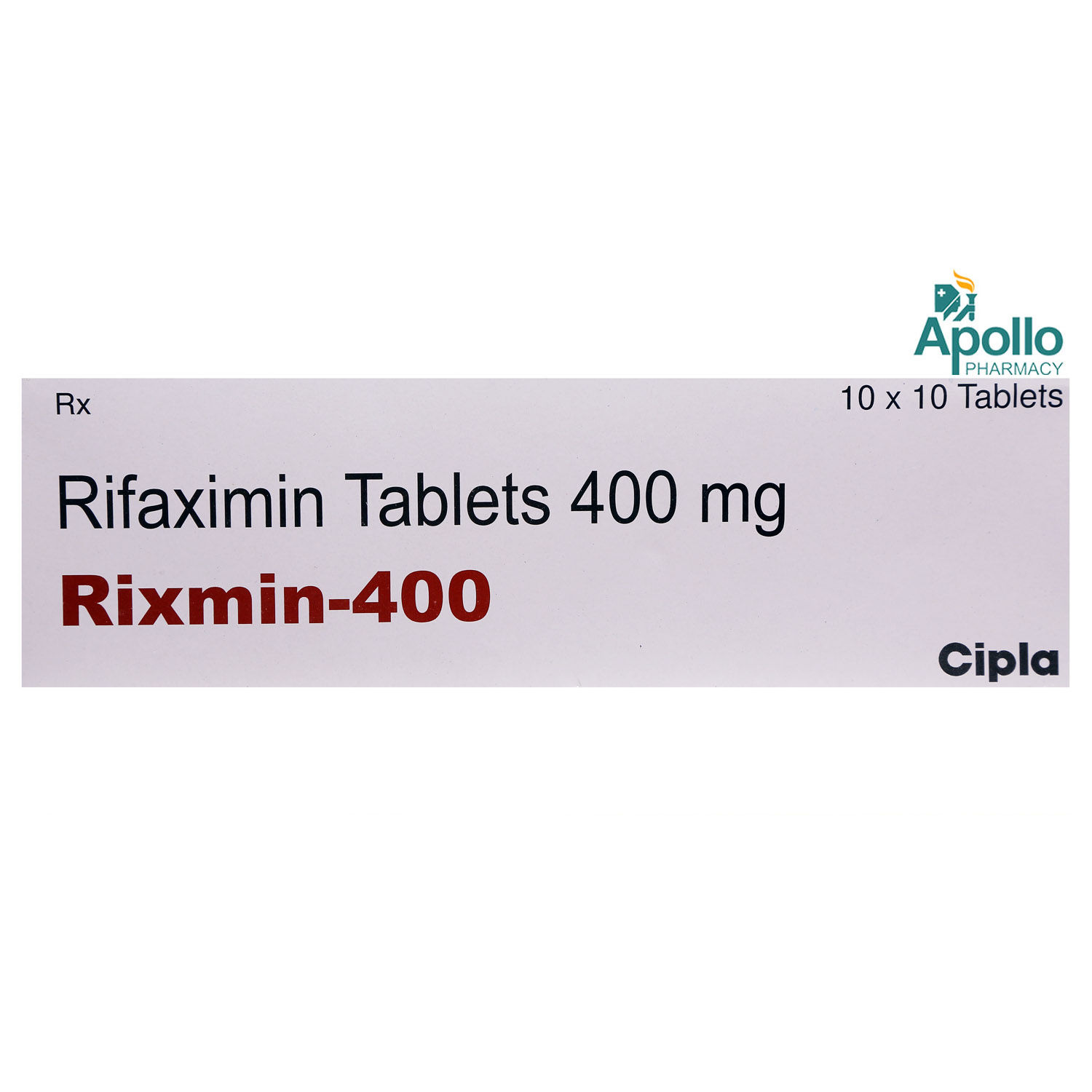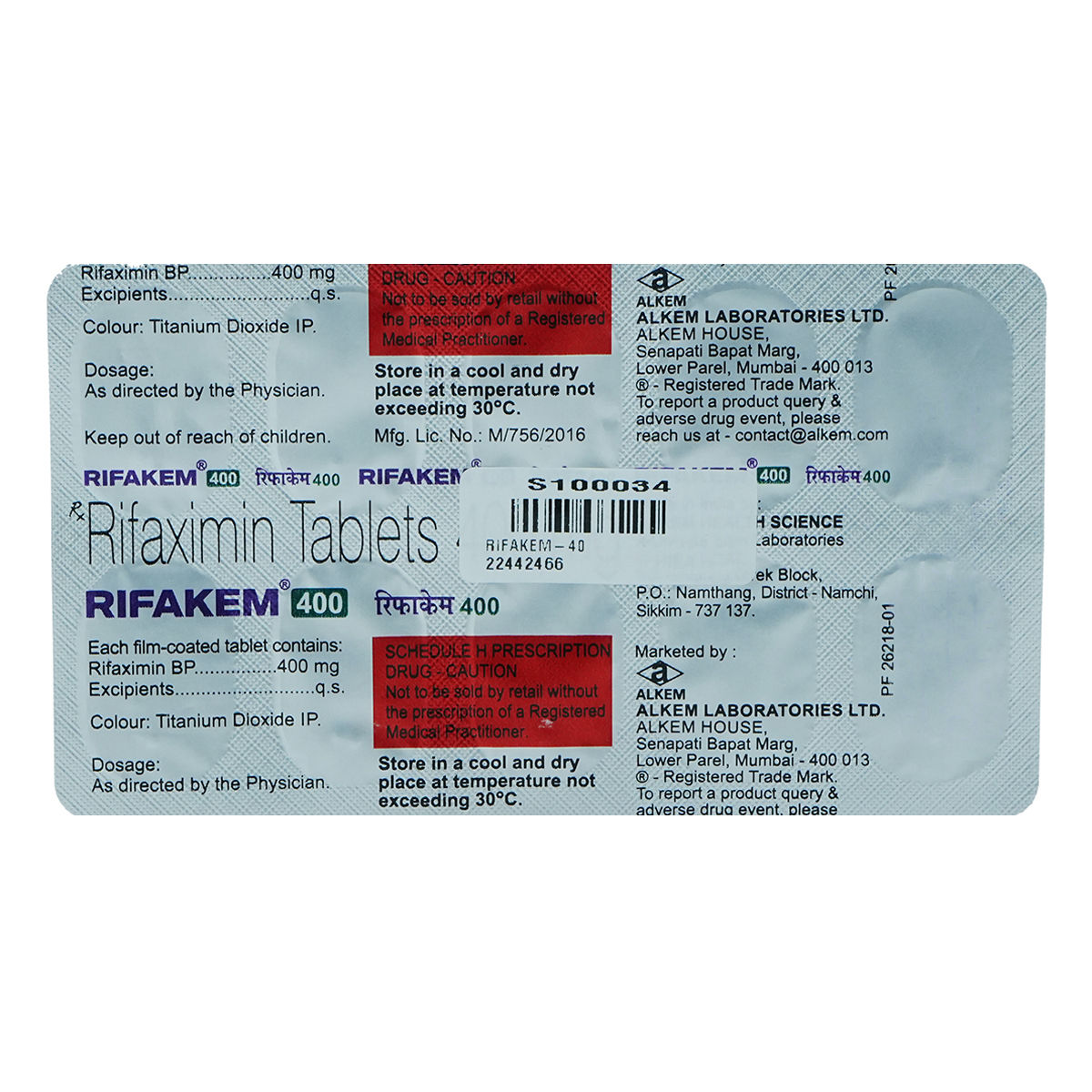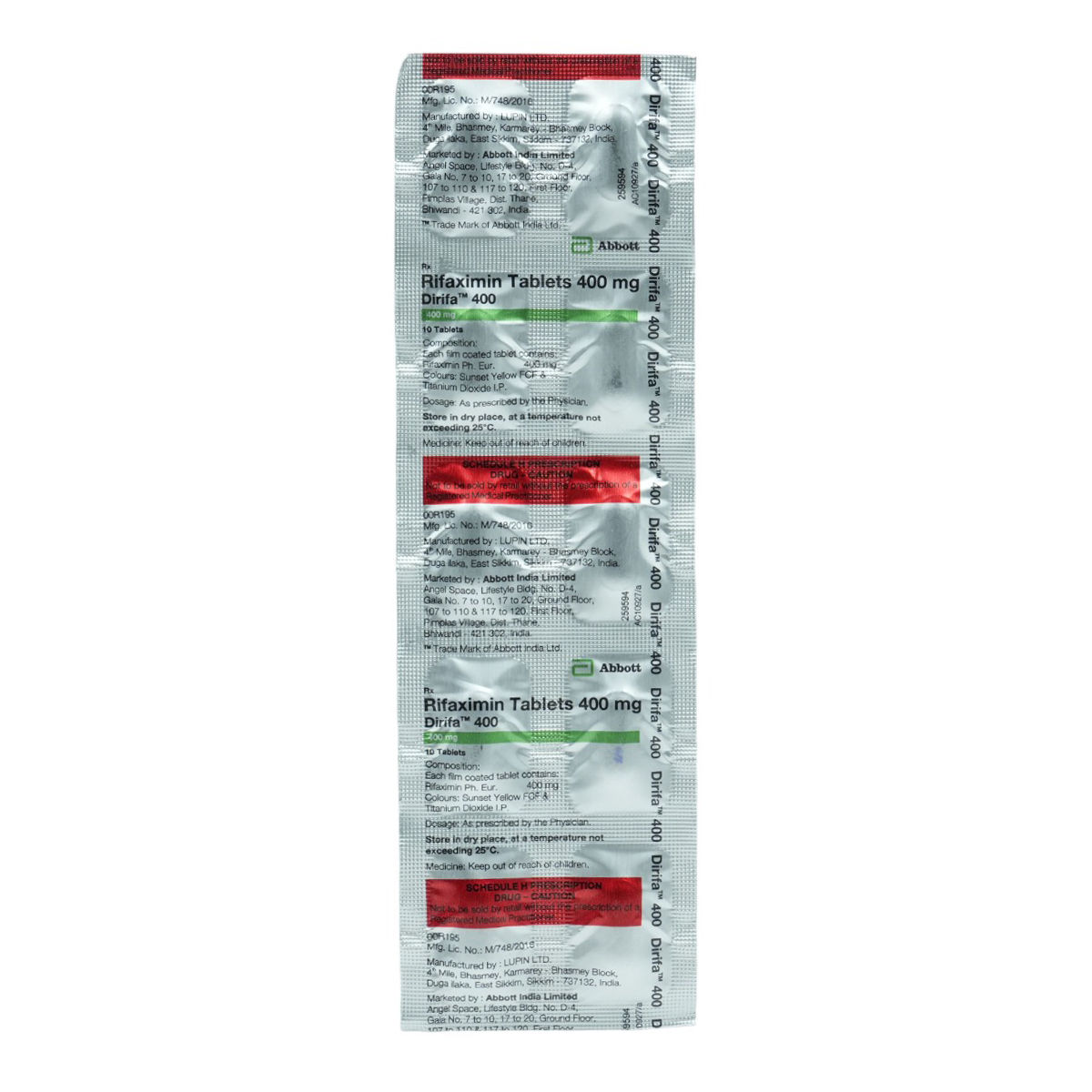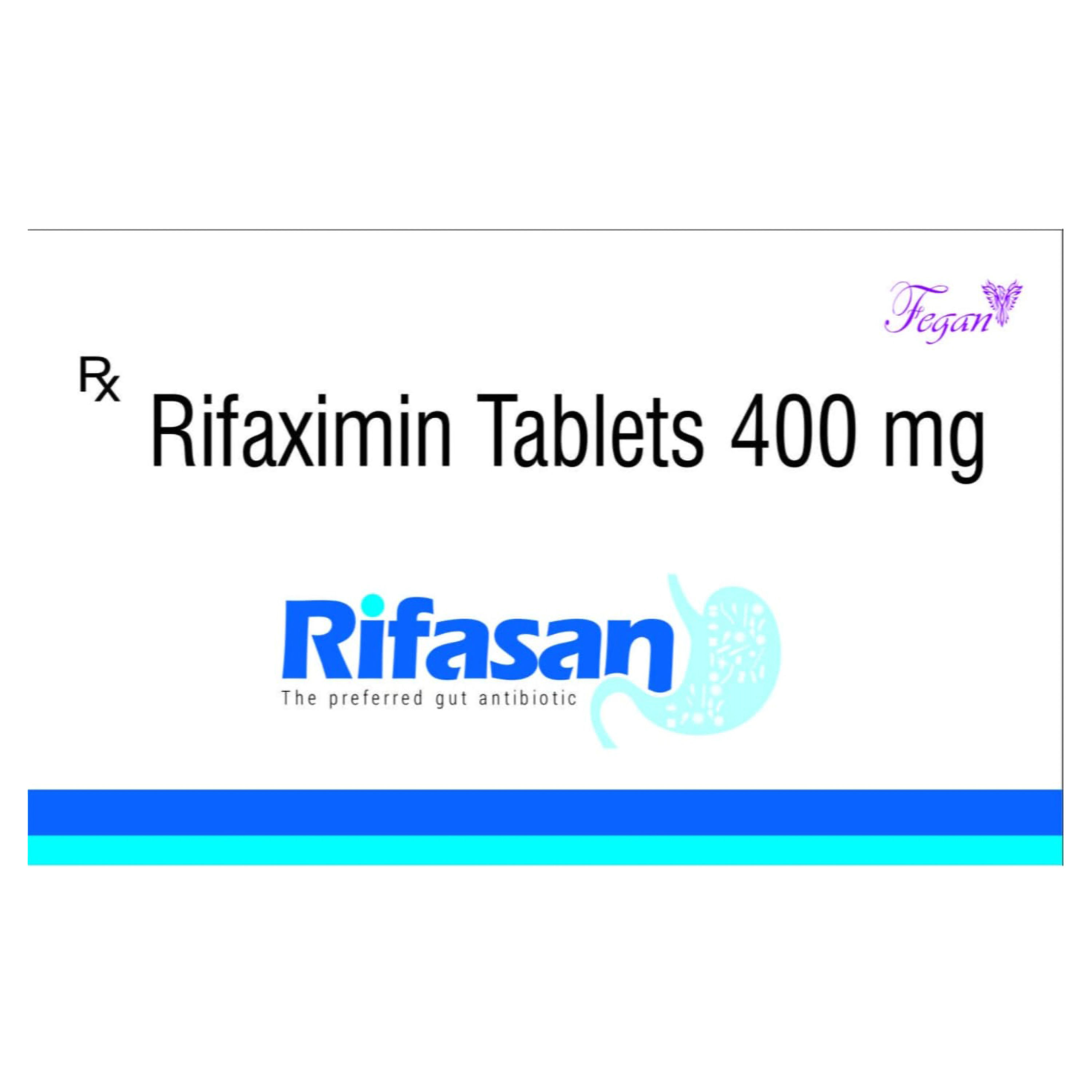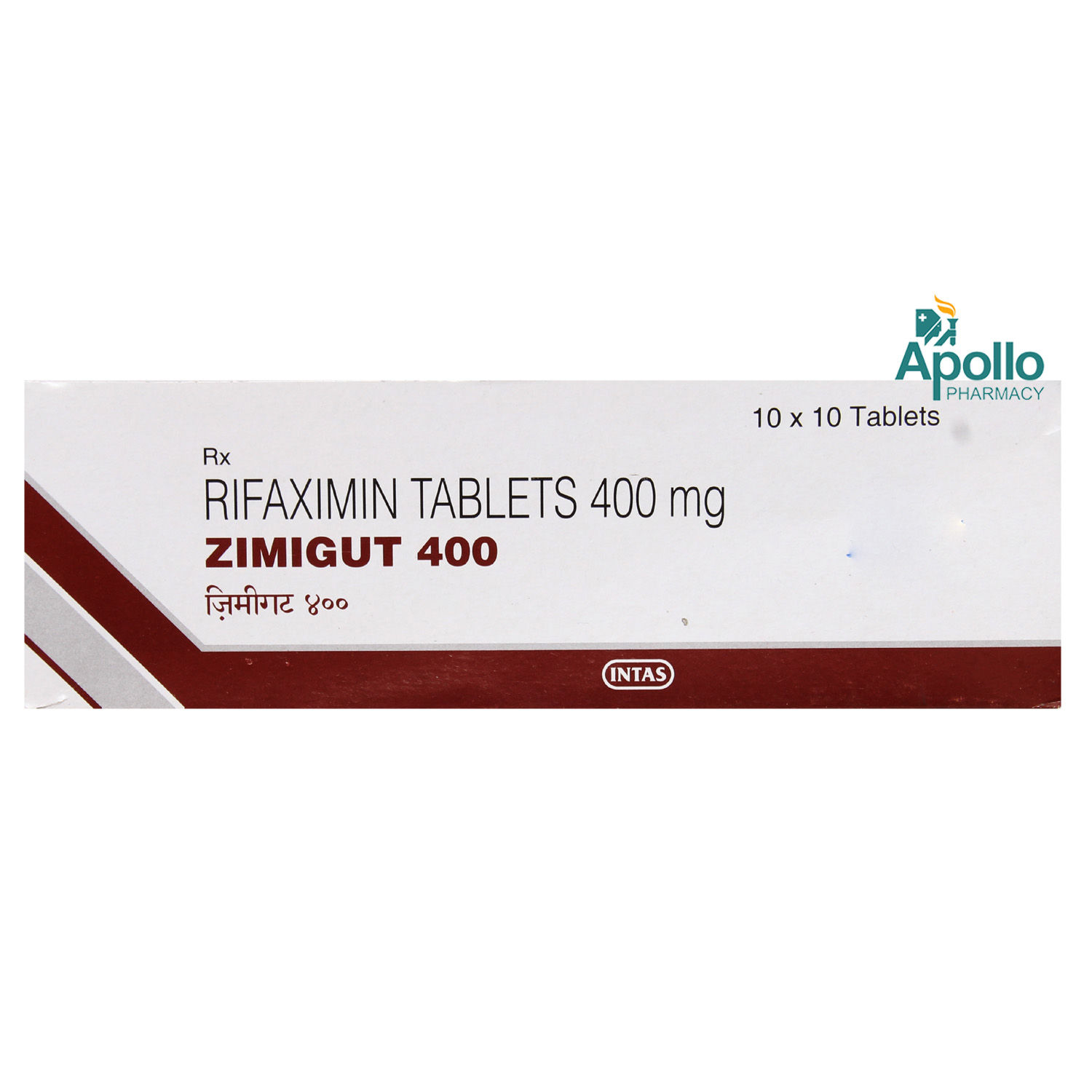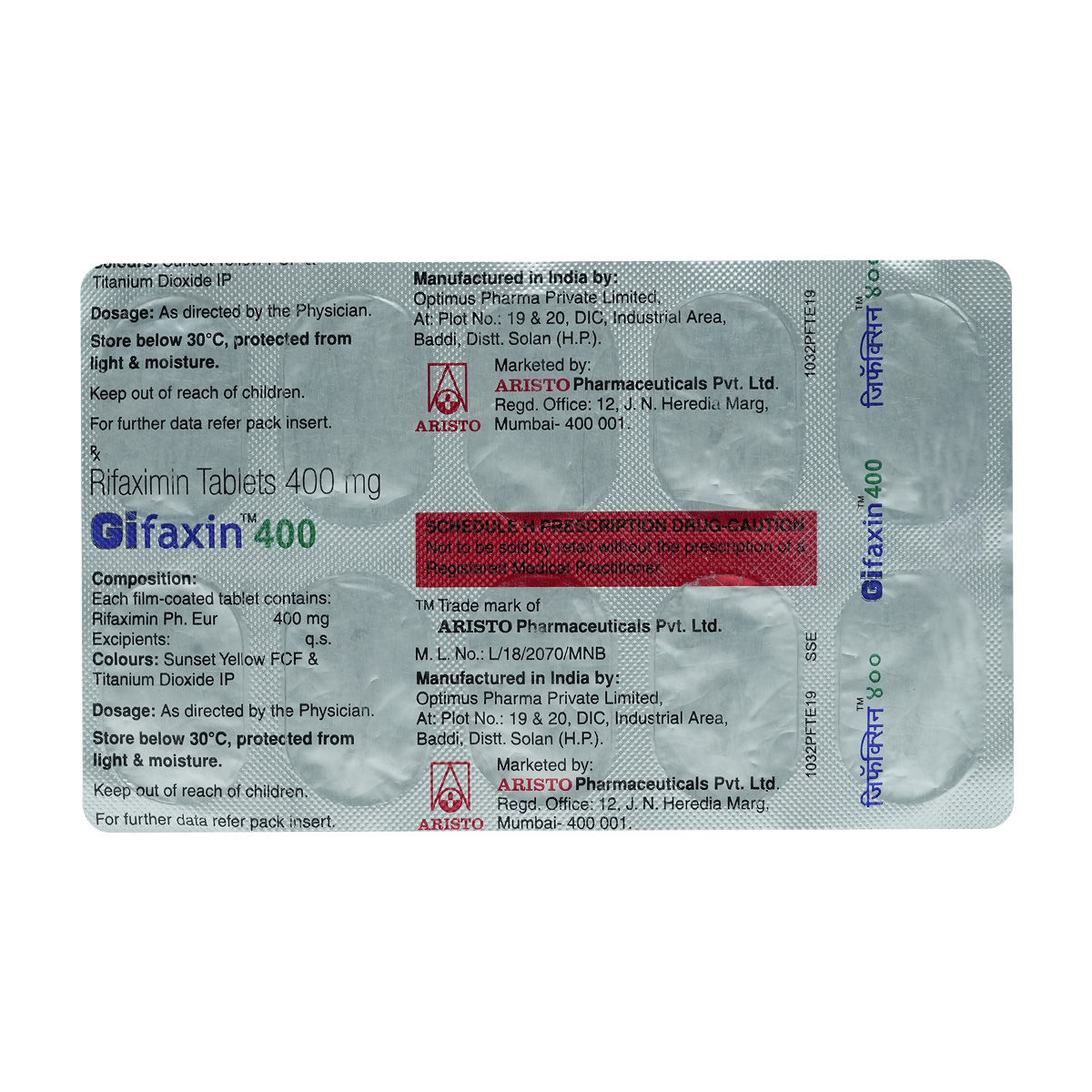Rifagut 400 Tablet 10's
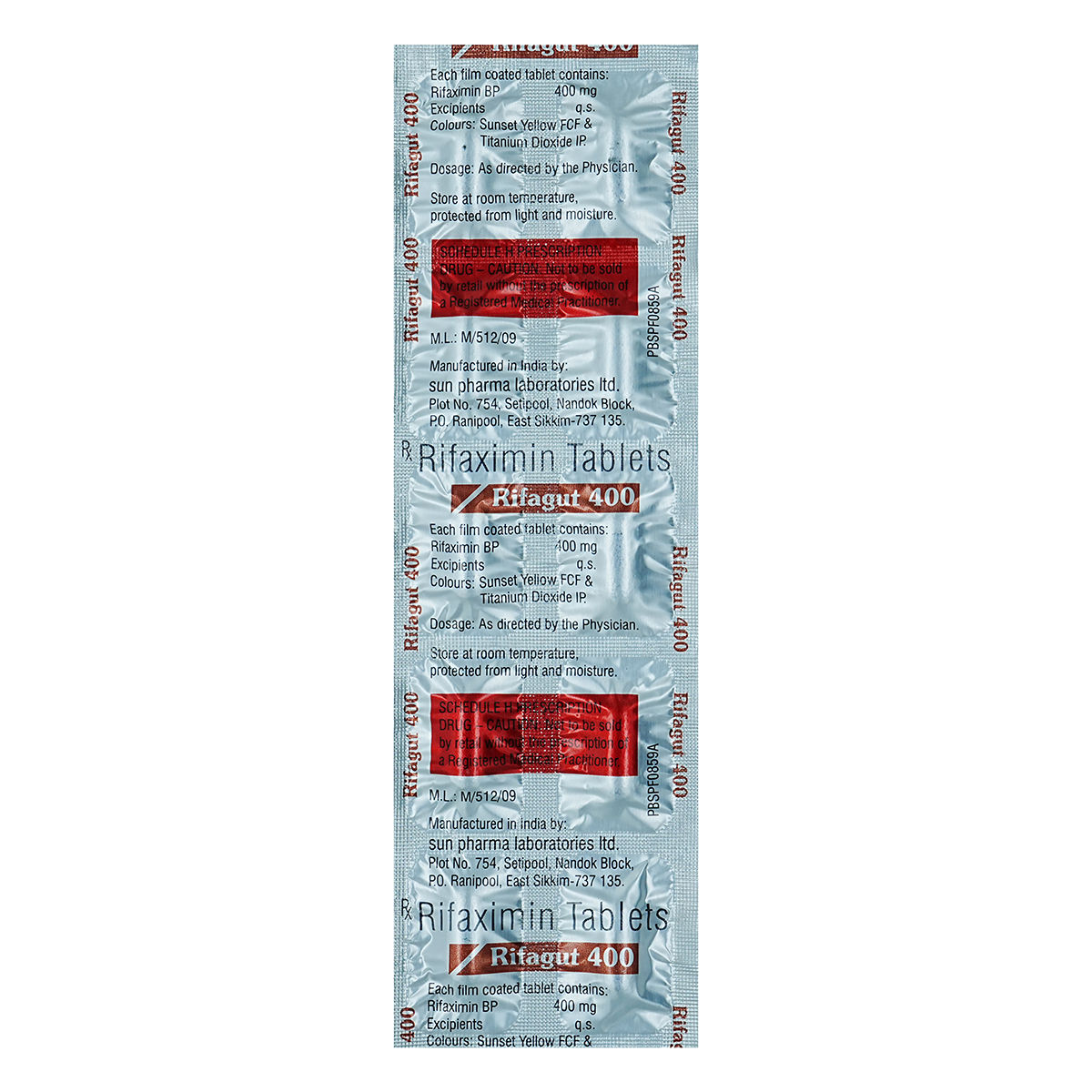

₹394.2*
MRP ₹438
10% off
₹372.3*
MRP ₹438
15% CB
₹65.7 cashback(15%)
Free Delivery
With Circle membership
(Inclusive of all Taxes)
This offer price is valid on orders above ₹800. Apply coupon PHARMA10/PHARMA18 (excluding restricted items)
Rifagut 400 Tablet is used to treat infectious traveller's diarrhoea caused by E.coli bacteria, hepatic encephalopathy (decreased brain function due to liver disease) and irritable bowel syndrome with diarrhoea (IBS-D). It contains Rifaximin, which works by working on the bowel and preventing the spread of infections caused by the loss of beneficial gut bacteria. Thus, it helps in relieving abdominal pain and diarrhoea. In some cases, you may experience common side effects such as headaches, peripheral oedema (leg swelling), nausea, dizziness, fatigue, ascites (excess fluid buildup in the abdomen), and increased liver enzymes (ALT). Before taking this medicine, you should tell your doctor if you are allergic to any of its components or if you are pregnant/breastfeeding, and about all the medications you are taking and pre-existing medical conditions.
Know Your Delivery Time
Provide Delivery Location
Available Offers
 Prescription drug
Prescription drugWhats That
 299 people bought
299 people bought 
Secure Payment

India's Most Trusted Pharmacy

Genuine Products
Composition :
Manufacturer/Marketer :
Consume Type :
Return Policy :
Expires on or after :
About Rifagut 400 Tablet
Rifagut 400 Tablet used to treat infectious traveller's diarrhoea caused by E.coli bacteria, hepatic encephalopathy (decreased brain function due to liver disease) and irritable bowel syndrome with diarrhoea (IBS-D). Traveller’s diarrhoea is an infection in which there is a passage of unformed stools. Hepatic encephalopathy causes loss of brain function when a damaged liver is unable to remove toxins from the blood. Irritable bowel syndrome is a condition which affects the large intestine.
Rifagut 400 Tablet contains ‘Rifaximin’, which works by working on the bowel and preventing the spread of infections caused by the loss of beneficial gut bacteria. Thus, Rifagut 400 Tablet helps in relieving abdominal pain and diarrhoea. Rifagut 400 Tablet should not be used in patients with diarrhoea complicated by fever or blood in the stool and diarrhoea due to pathogens other than Escherichia coli (E.coli).
Take Rifagut 400 Tablet with or without food. In some cases, you may experience common side effects such as headaches, peripheral oedema (leg swelling), nausea, dizziness, fatigue, ascites (excess fluid buildup in the abdomen), and increased liver enzymes (ALT). Most of these side effects do not require medical attention and will resolve gradually over time. However, you are advised to talk to your doctor if you experience these side effects persistently.
Before starting Rifagut 400 Tablet , please inform your doctor if you have any allergies (to any antibiotic), kidney or liver problems. Do not take Rifagut 400 Tablet for more than 3 days unless your doctor prescribes it; if you don't experience symptomatic improvement, consult your doctor. Avoid taking Rifagut 400 Tablet if you are pregnant or breastfeeding; talk to your doctor; he/she may prescribe you an alternative medicine. Rifagut 400 Tablet is not recommended for children as efficacy and safety have not been established. Inform your doctor about all the medications you are taking and your health condition to help rule out any unpleasant side effects.
Uses of Rifagut 400 Tablet
• Diarrhea in Travelers: Rifagut 400 Tablet is frequently used to treat patients' diarrhea brought on by non-invasive strains of Escherichia coli when they are visiting places with contaminated food or water.
• Irritable Bowel Syndrome (IBS): By treating intestinal bacterial overgrowth, Rifagut 400 Tablet can help reduce IBS symptoms, especially those with diarrhoea as the predominant symptom.
• Simple Infections: Rifagut 400 Tablet works well for treating simple gastrointestinal infections that might not be improving with other antibiotics.
• Complications Associated with Liver Disease: By reducing the amount of ammonia-producing bacteria in the gut, this medication helps treat hepatic encephalopathy. This condition can develop in people with liver disease.
Directions for Use
Swallow the medicine as a whole with a glass of water; do not chew or break it.
Medicinal Benefits
Rifagut 400 Tablet belongs to the group of medicines called antibiotics used to treat infectious travellers diarrhoea, hepatic encephalopathy (decrease in brain function due to liver disease) and irritable bowel syndrome (IBS). Rifagut 400 Tablet is used to treat traveller’s diarrhoea caused by non-invasive strains of E.coli. Rifagut 400 Tablet is a broad-spectrum antibiotic that is effective against gram-positive and gram-negative bacteria, aerobic and anaerobic bacteria, and ammonia-producing bacteria. Rifagut 400 Tablet is a gastrointestinal-selective antibiotic with a broad spectrum of antimicrobial activity. Rifagut 400 Tablet is bactericidal in nature and works by killing the bacteria that cause infections. Thus, it helps in treating and preventing the spread of infections.
How Rifagut 400 Tablet Works
Storage
- Tell your doctor about your GAS symptoms. They may change your medication regimen or prescribe additional drugs to help you manage them.
- To manage GAS symptoms, eat a balanced diet of fibre, vegetables, and fruits.
- Drink enough water throughout the day to avoid constipation and treat GAS symptoms.
- Regular exercise like yoga and walking may help stimulate digestion and alleviate GAS symptoms.
- Take probiotics only if your doctor advises, as they may help alleviate GAS symptoms by promoting gut health.
- Take medication for GAS symptoms only if your doctor advises, as certain medications can interact with your existing prescriptions or worsen symptoms.
- If symptoms persist, worsen, or are accompanied by severe abdominal pain, vomiting, or bleeding, seek immediate medical attention.
- Hydrate your body: Drink enough water to prevent dehydration and headaches.
- Calm Your Mind: Deep breathing and meditation can help you relax and relieve stress.
- Rest and Recharge: Sleep for 7-8 hours to reduce headache triggers.
- Take rest: lie down in a quiet, dark environment.
- Cold or warm compresses can help reduce tension.
- Stay Upright: Maintain good posture to keep symptoms from getting worse.
- To treat headaches naturally, try acupuncture or massage therapy.
- Over-the-counter pain relievers include acetaminophen and ibuprofen.
- Prescription Assistance: Speak with your doctor about more substantial drug alternatives.
- Severe Headaches: Seek emergency medical assistance for sudden, severe headaches.
- Frequent Headaches: If you get reoccurring headaches, consult your doctor.
- Headaches with Symptoms: Seek medical attention if your headaches include fever, disorientation, or weakness.
- Drink water or other clear fluids.
- To prevent worsening of pain, limit intake of tea, coffee, or alcohol.
- Include bland foods like rice, toast, crackers, and rice in your diet.
- Avoid lying down immediately after eating as it may cause indigestion or heartburn.
- Avoid acidic and spicy food as it may cause indigestion.
- Eat fiber-rich foods like whole grains, fruits, vegetables, and legumes to promote regular bowel movements.
- Drink plenty of water to soften stool and make it easier to pass.
- Avoid trigger foods like dairy, gluten, or spicy foods that can worsen constipation.
- Exercise regularly, like walking or yoga, to stimulate bowel movements.
- Practice yoga and pelvic floor exercises to strengthen muscles involved in bowel movements.
- Inform your doctor if you experience severe symptoms like abdominal pain, vomiting, or blood in the stool.
- Inform your doctor about the nausea and discuss possible alternatives to the medication or adjustments to the dosage.
- Divide your daily food intake into smaller, more frequent meals to reduce nausea.
- Opt for bland, easily digestible foods like crackers, toast, plain rice, bananas, and applesauce.
- Avoid certain foods that can trigger nausea, such as fatty, greasy, spicy, and smelly foods.
- Drink plenty of fluids, such as water, clear broth, or electrolyte-rich beverages like coconut water or sports drinks.
- Use ginger (tea, ale, or candies) to help relieve nausea.
- Get adequate rest and also avoid strenuous activities that can worsen nausea.
- Talk to your doctor about taking anti-nausea medication if your nausea is severe.
- Record when your nausea occurs, what triggers it, and what provides relief to help you identify patterns and manage your symptoms more effectively.
- Inform your doctor about your constipation symptoms. They may adjust your medication or advise alternative treatments.
- Stay hydrated by drinking sufficient of water (at least 8-10 glasses a day) to help soften stool and promote bowel movements.
- Increase fibre intake by eating foods high in fibre, such as fruits, whole grains, vegetables and legumes, to help bulk up the stool.
- Establish a bowel routine by trying to go to the bathroom at the same time each day to train your bowels.
- Engaging in regular exercise, like walking or yoga, can support in bowel movement stimulation.
- Consult your doctor if constipation persists, and discuss alternative treatments or adjustments to your medication.
- Inform your doctor immediately if you experience a fever after starting a new medication.
- Your doctor may adjust your medication regimen or dosage as needed to minimize fever symptoms.
- Monitor your body temperature to monitor fever progression.
- Drink plenty of fluids, such as water or electrolyte-rich beverages, to help your body regulate temperature.
- Get plenty of rest and engage in relaxation techniques, such as deep breathing or meditation, to help manage fever symptoms.
- Under the guidance of your doctor, consider taking medication, such as acetaminophen or ibuprofen, to help reduce fever.
- If your fever is extremely high (over 103°F), or if you experience severe symptoms such as confusion, seizures, or difficulty breathing, seek immediate medical attention.
What if I have taken an overdose of Rifagut 400 Tablet
Drug Warnings
Do not take Rifagut 400 Tablet if you are allergic to any of its contents, if you have a fever, blood in stools, passed 8 or more unformed stools in the last 24 hours, constipation, vomiting, and abdominal pain caused by blockage of the bowel. Talk to your doctor if your condition does not improve, symptoms continue or re-appear even after taking Rifagut 400 Tablet for 3 days. Do not take Rifagut 400 Tablet for more than 3 days unless prescribed; if there is no symptomatic improvement, consult your doctor. Avoid taking Rifagut 400 Tablet if you are pregnant or breastfeeding; talk to your doctor; he/she may prescribe you with alternate medicine. Rifagut 400 Tablet is not recommended for children below 12 years of age as the efficacy and safety have not been established. Inform your doctor about all the medicines you are taking and about your health condition to rule out any unpleasant side effects. Patients with liver complications should avoid taking Rifagut 400 Tablet or consult a doctor before using Rifagut 400 Tablet .
Drug-Drug Interactions
Drug-Drug Interactions
Login/Sign Up
Coadministration of cholera vaccine with Rifagut 400 Tablet may reduce the effect of the cholera vaccine.
How to manage the interaction:
Taking Rfaximine and Cholera, live attenuated together can result in an interaction, but it can be taken together if prescribed by a doctor. It is recommended to take the cholera vaccine at least 14 days following the last dosage of Rifagut 400 Tablet. Do not discontinue any medicine without consulting a doctor.
Drug-Food Interactions
Drug-Food Interactions
Login/Sign Up
Diet & Lifestyle Advise
- Antibiotics can alter the useful bacteria in the stomach, which helps indigestion. Therefore, you are advised to take foods rich in probiotics such as yoghurt/curd, kefir, sauerkraut, tempeh, kimchi, miso, kombucha, buttermilk, natto and cheese.
- Eat fibre-rich food like whole grains, beans, lentils, berries, broccoli, peas and bananas.
- Avoid foods rich in calcium, such as grapefruit and grapefruit juice, as they might hinder the absorption of antibiotics.
- Avoid consumption of alcohol to treat your condition effectively.
- Avoid the usage of tobacco.
Habit Forming
Therapeutic Class
Rifagut 400 Tablet Substitute

Rcifax 400 Tablet 10's
by Others
₹46.49per tabletRifaxigress-400 Tablet 10's
by AYUR
₹30.78per tabletSibofix-400 Tablet 10's
by Others
₹42.57per tabletRixmin 400 Tablet 10's
by Others
₹37.80per tabletRifakem-400 Tablet 10's
by AYUR
₹34.02per tablet
Product Substitutes
Alcohol
Caution
Please consult your doctor as it is not known whether alcohol affects the working of Rifagut 400 Tablet . However, you are advised to limit or avoid alcohol consumption to prevent unpleasant side-effects.
Pregnancy
Caution
It is not recommended to take Rifagut 400 Tablet while you are pregnant. Please consult your doctor if you have any concerns regarding this, your doctor will decide whether Rifagut 400 Tablet can be given to pregnant women or not.
Breast Feeding
Caution
Please consult your doctor if you have any concerns regarding this, your doctor will decide whether Rifagut 400 Tablet can be given to breastfeeding mothers or not.
Driving
Safe if prescribed
Rifagut 400 Tablet does not affect your ability to drive. However, do not drive or operate heavy machinery if you feel dizzy.
Liver
Caution
Please consult your doctor if you have any concerns regarding this or if you have liver impairment/liver disease before taking Rifagut 400 Tablet .
Kidney
Caution
Please consult your doctor if you have any concerns regarding this or if you have kidney impairment/kidney disease before taking Rifagut 400 Tablet .
Children
Unsafe
Rifagut 400 Tablet is not recommended for children as the efficacy and safety have not been established.
FAQs
Rifagut 400 Tablet is used to treat infectious traveller's diarrhoea caused by E.coli bacteria, hepatic encephalopathy (decreased brain function due to liver disease) and irritable bowel syndrome with diarrhoea (IBS-D).
Rifagut 400 Tablet is bactericidal in nature and works by killing the harmful bacteria that cause infections in the gut or intestine like E coli bacteria. Thereby, helps in treating/preventing the spread of infections and diarrhoea with abdominal pain.
It is recommended to complete the course of Rifagut 400 Tablet even if you feel better as it is an antibiotic, and leaving it in between may lead to even severe infection that will, in fact, stop responding to the antibiotic as well (antibiotic resistance).
Do not take Rifagut 400 Tablet on your own as self-medication may lead to antibiotic-resistance in which antibiotics fail to act against specific bacterial infections. Take Rifagut 400 Tablet only if prescribed by a doctor.
Rifagut 400 Tablet may affect blood tests and liver function tests with increased liver enzymes. Inform the person or doctor before performing the tests that you are taking Rifagut 400 Tablet .
For treating traveller's diarrhoea, Rifagut 400 Tablet is generally prescribed for 3 days. For irritable bowel syndrome, Rifagut 400 Tablet is prescribed for 14 days. However, it is better to take Rifagut 400 Tablet only as prescribed by your doctor.
No, Rifagut 400 Tablet may affect the activity and working of warfarin when taken together. So tell your doctor before using Rifagut 400 Tablet that you are taking a blood thinner (warfarin). Your doctor might adjust the dose of warfarin to maintain the proper blood-thinning effect and prevent drug interaction.
Do not take Rifagut 400 Tablet for more than 3 days unless prescribed; if there is no symptomatic improvement, consult your doctor.
Rifagut 400 Tablet should not be used in patients with diarrhoea complicated by fever or blood in the stool and diarrhoea due to pathogens other than Escherichia coli (E. coli).
Take Rifagut 400 Tablet exactly as prescribed by the doctor. Take it at the same time daily as it will help you to remember taking the medication.
Rifagut 400 Tablet contains Rifaximin used to treat infectious traveller’s diarrhoea, hepatic encephalopathy (decrease in brain function due to liver disease) and irritable bowel syndrome.
Side effects of Rifagut 400 Tablet include headache, peripheral oedema (leg swelling), nausea, dizziness, fatigue, ascites (excess fluid build-up in the abdomen), increased liver enzymes (ALT), and nausea. Talk to your doctor if you experience these side effects persistently.
Rifagut 400 Tablet is an antimycobacterial which works by killing the bacteria that cause infection.
Rifagut 400 Tablet can be taken with or without food.
Rifagut 400 Tablet decreases the symptoms in case of liver disease by killing harmful bacteria in the gut. Thereby it helps lower the possibility of toxins.
Rifagut 400 Tablet may not cause weight gain. Maintain proper weight by eating healthy and doing exercise. Consult the doctor if you notice changes in your weight.
Country of origin
Manufacturer/Marketer address
Customers Also Bought
Disclaimer
Author Details
We provide you with authentic, trustworthy and relevant information












